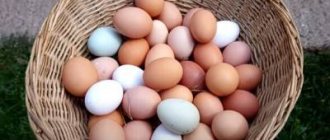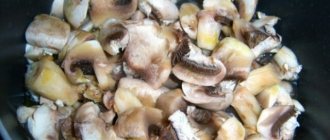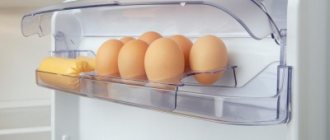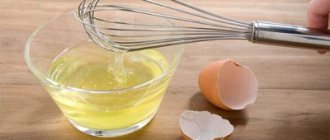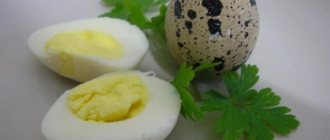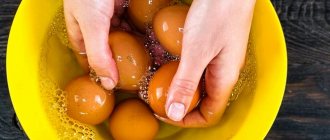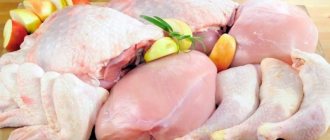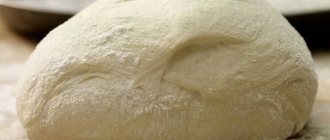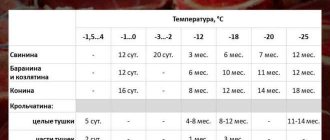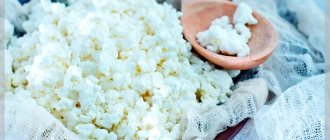How many days to store?
Quail eggs differ from chicken eggs not only in shape, size and composition, but also in preservation. The product retains its beneficial properties at low temperatures.
Shelf life of raw eggs
You should not keep the eggs in the room for a long time: this will significantly reduce their shelf life. The product retains its beneficial properties for the maximum amount of time when the temperature is controlled.
Eggs are stored:
- in a room with low humidity – 25-35 days,
- in the refrigerator (on the shelf, not on the door) - 55-65 days.
After two months, the product can be used in cooking to prepare:
- salads,
- bakery products,
- second courses.
Quail eggs contain a protein substance - lysozyme, thanks to which the product has such a long shelf life . But over time, it contains fewer nutrients.
How many days do boiled eggs last?
The finished product is stored for a short period of time. It must be used within seven days.
It is important to comply with the terms and conditions:
- Boiled eggs should be stored when they are hard-cooked.
- Soft-boiled ones are stored for 2-3 hours.
- In the absence of a refrigerator, the finished product retains its beneficial properties for 8-11 hours. To prevent the eggs from cracking and spoiling ahead of time, after boiling they are wrapped in newspaper or paper.
- In the refrigerator, the shelf life increases - 5-6 days. A whole product is stored longer, damaged, with a cracked shell - 1-2 days.
Be sure to read:
How to quickly defrost dough: effective methods, basic rules
Eggs are placed separately from fish products, citrus fruits and spices - they “absorb” the smell and spoil faster.
In salads
The shelf life of quail eggs in salads is much shorter and is 24-48 hours. The time to consume the finished salad depends on the ingredients and dressing.
Salads dressed with mayonnaise are stored in a cool place for no more than a day. A prepared dish with olive oil can be placed on the table after 48 hours, but if it does not contain any perishable product.
How to check freshness
At poultry farms and laboratories, the freshness of the product is determined using an ovoscope - a device for candling eggs. High-quality quail eggs should be:
- no traces of droppings or cracks on the shell;
- regular shape without limescale build-up;
- with one yolk located in the center;
- with an air chamber at the blunt end;
- no signs of blood or other foreign matter.
When storing at home, freshness can be checked as follows:
- Immerse the egg in a container with a saturated salt solution. The fresh ones will sink to the bottom. It is not recommended to use anything that rises to the surface for food.
- Break the egg onto a plate; it should retain its shape. If the protein is watery and spreads all over the plate, the product is not fresh.
- The contents should not have any foreign odors.
- When boiled, the cut yolk should be a uniform yellow color.
You cannot determine freshness by the richness of the color of the yolk. Its shade depends on the composition of the feed, and not on the time of laying
Do you know that…
Hatching quail eggs are stored at room temperature, but not lower than 10 °C.
Secrets of refrigerator storage
Eggs retain their beneficial qualities for approximately two months , but experienced housewives claim that this time can be increased.
It is worth following a few simple rules:
- Quail eggs are stored in their original packaging. If it is not there, buy a tray.
- Observe the temperature regime – +3…+5 ˚С.
- The testicles can be preserved longer by using beeswax. Hard-boiled eggs are placed in melted wax so that it covers the shell on all sides, and wait to cool. Place in the tray with the sharp end down. If there is no wax in the house, use any fat.
- The current shelf life is increased by three days: the eggs are dipped in a solution of potassium permanganate and wiped with sunflower oil.
- Refrigerator doors are not suitable for long-term storage; it is better to choose lower drawers. You can pour certified salt into the tray.
- The eggs are stored frozen in the freezer for 9-11 months. They must be free of cracks.
These simple rules will help preserve the product for a long time without losing its beneficial properties.
Optimal storage conditions
In order for eggs to be stored properly and not lead to food poisoning, they need to be provided with normal conditions. It is recommended to take into account several important parameters.
Temperature
There are several options for maintaining temperature conditions. Depending on this, the following types of storage are distinguished:
- In a dry, ventilated room at a temperature of +22-24 degrees. If the product is opened, it retains its characteristics for 1 month.
- Under the same conditions, but in a closed container, the products can remain fresh for 2 months.
- Temperatures of 0-8 degrees ensure longer storage. It can last 4 months.
Illumination
It is best to keep the products in a dark place. This could be the bottom shelf of the refrigerator or a closed tray.
In any case, it is important that the surface is not exposed to direct sunlight.
Correct masonry
It is recommended to place the product in trays with the sharp side down. Thanks to this, the yolk will not reach the air gap, which is located at the blunt end. It is permissible to wash eggs only before eating. Otherwise, their shelf life will be reduced to 1 month.
The product has a thin and fragile shell. Therefore, every month the products should be checked and sorted. In this case, it is recommended to remove soft or damaged specimens.
Package
Products may be stored on special stands. It is also acceptable to use the tray in which it was sold for this purpose.
Storage at room temperature
The room should be warm and dry. But the air temperature should not exceed +25˚С.
If you adhere to the norm, the shelf life is one month. When humidity is high, bacteria begin to multiply in the testicles.
If the temperature in the apartment is not maintained, eggs are stored in water. They are placed in a container or bowl, filled with water, and 1 tbsp is added. l. table salt.
Be sure to read:
How long can propolis be stored: tincture and dry form?
If they float up, the product is spoiled.
How to choose a quality product
To select high-quality quail eggs, follow two basic rules :
- Open the package and carefully inspect the shell for chips and cracks. The whole shell guarantees long-term storage.
- Pay attention to the expiration date indicated on the packaging.
The uniqueness of quail eggs lies in the fact that a spoiled product does not rot, but shrinks from the inside . If you suspect that the product has disappeared, just place a raw quail egg in water. Dried specimens will float.
Attention! The weight of a quail egg is 10-12 g. If it weighs less, there is a high probability that it has dried out and is no longer suitable for consumption.
When choosing a product, do not pay attention to the color of the shell . The color and number of spots depend on the breed of quail and do not in any way affect the taste or ability of the eggs to be stored for a long time.
How to easily peel quail eggs?
Quail eggs can be easily peeled in a variety of ways. To facilitate the cleaning process, after heat treatment they are placed in cold water.
Quail eggs have a dense shell and will take longer to clean than chicken eggs.
Method 1
Sequencing:
- Place the product in a bag or wrap it in cling film.
- Transfer to a hard surface (countertop, board).
- Press with your hand: the shell should crack.
- Gently pull the film - the shell will be easily removed.
Method 2
Sequencing:
- Place the eggs in a container.
- Fill with water and close the lid.
- Shake - the shell cracks and is easily removed.
conclusions
- Quail eggs are a popular, healthy product, which contains a large amount of vitamins, macroelements, as well as mono and poly acids.
- Vitamin U is especially valuable. In winter, when there is no greenery, raw egg yolk is its only source. But at temperatures above 60 ᵒC it decomposes. Therefore, it is recommended to consume quail eggs raw.
- The benefits of this food product for the human body are preserved provided that the rules and shelf life are followed.
Store correctly and be healthy!
We take into account the date of purchase and laying of eggs
It is important to consider the packaging date of eggs when purchasing them at the store. It is indicated on the top of the plastic box. An equally important factor is the date of laying: it is stamped on the eggs themselves.
It is worth buying only fresh product - the period from the date of demolition to purchase should not exceed three weeks.
Having bought eggs at the market, the buyer will not know the exact date. The product should be consumed within two weeks, after checking its freshness.
Before purchasing, you should ask the seller for the demolition period; it should not exceed 7-10 days.
You should not buy the product at the market - the eggs may be spoiled or stale.
It is recommended to cook the eggs during the first month - during this period they are most useful. After the shelf life expires, they may not deteriorate, but they will not bring any benefit.
Features of storing raw eggs
The shelf life of quail eggs largely depends on the conditions in which this product finds itself:
the temperature should not fall below zero and rise above 24 ° C; It is better to store them in rooms with a relative humidity of 70%; The product should not be exposed to sunlight, so a window sill is not an option; It is recommended to wash immediately before use, otherwise their shelf life will be reduced by approximately half, since the air permeability of the shell will be impaired and the process of deterioration will begin inside; it is important that each egg is in the correct position, that is, with the blunt end up, because it is on this side under the shell that there is a small air chamber designed to provide oxygen to the future chick and remove carbon dioxide and hydrogen sulfide; the integrity of the shell should not be compromised; specimens with damaged shells must be cooked and eaten first; By the way: their protective shell is not as fragile as chicken shells, and when they fall, they usually do not break, because their thin shell simply wrinkles. However, they require delicate handling and are best stored in a special container; store-bought cellular packaging is also perfect. In the refrigerator they are often usually stored on the door shelf, which is actually not so practical
Temperature changes and repeated daily shaking are not good for them. But a compartment for storing fresh vegetables and fruits is an ideal place!
In the refrigerator, it is often customary to store them on the door shelf, which is actually not that practical. Temperature changes and repeated daily shaking are not good for them. But a compartment for storing fresh vegetables and fruits is an ideal place!
If there is no refrigerator
Don't be upset if you don't have a refrigerator at home. Food will retain nutrients without low temperature.
To do this, place at the bottom of a wooden basket:
- sand,
- sawdust,
- salt,
- wood ash,
- bran.
The eggs are wiped with fat, placed in a box, and covered with a lid. When the room is dry, they are stored for 30-50 days.
Be sure to read:
Is it possible to store honey in the refrigerator and freeze it: expert opinion
Expiration dates
According to GOST, experts have established certain values. It is allowed to store eggs at thermometer values from 0 to 8 °C for up to 30 days from the date of production.
The date of sorting, which is carried out the next day, is indicated on the shell. Since this applies only to factory-made products, it is better to purchase goods in supermarkets, where the risk of purchasing expired goods is reduced.
Information about expiration dates is also printed on the packaging.
Raw
The deadlines established by GOST apply to raw eggs, which can be stored for a month if the rules are followed. But this is in theory.
In practice, if a high-quality product is purchased and stored in the refrigerator, the duration can be increased by 2 times or more.
Boiled soft-boiled or hard-boiled
Heat treatment significantly reduces shelf life. If the eggs are soft-boiled, they should be consumed immediately. Bacteria actively multiply in them. Moreover, the fresh dish has a pleasant taste and aroma.
If it becomes necessary to preserve soft-boiled eggs, the permissible duration is 2 hours in the refrigerator. Low temperatures will slow down the growth of bacteria, but not for long.
Hard-boiled eggs last much longer in the refrigerator - up to 7 days. But this rule is valid if the shell is intact. If it is cracked, it is better to eat the egg right away. The maximum number of days for refrigeration is 4.
At room temperature, the product with the whole shell can be kept for no more than 12 hours. All this applies only to hard-boiled products - those that have been boiled for 7-10 minutes.
Included in the dish
Eggs go well with a variety of foods and are often included in salads. In the absence of salt and sauce, keeping the product in the refrigerator is only permissible for a few hours. The rule cannot be neglected if the snack includes fresh vegetables.
Quail and chicken - is there a difference in storage and timing?
Food safety differs from each other.
It is important to control the number of days and temperature conditions.
| Characteristic | Quail eggs (days) | Chicken eggs (days) |
| Indoors (wet) | 25-35 | 20-23 |
| In the refrigerator (raw) | 55-65 | Homemade – 85-90, store-bought – 25-30 |
| In the refrigerator (boiled whole) | 5-6 | 13-15 |
| In the refrigerator (boiled, with damaged shells) | 1-2 | 3-4 |
Factors that affect storage duration
The shelf life is affected by the presence of an antibacterial agent in the eggs. It stops the development of bacteria - quail products last longer.
Also, the duration of the period depends on the condition of the shell (cracked, broken), additional factors:
- temperature;
- air humidity;
- proximity of products.
Useful and not so useful properties of quail eggs
The product has a lot of useful qualities. The main use of eggs is to improve immunity, since the content of beneficial microelements consists of vitamins A, D, B, useful elements: potassium, sodium, magnesium, iron, phosphorus and many others. The nutritional value of one egg is about 17 calories, boiled - 15 calories.
Experts have determined how many eggs can be consumed and to whom:
- children under three years old, no more than 2 pieces;
- children from three to ten years old, no more than 3;
- up to 18 years old – 4 pieces;
- from 18 to 50 years old – 5 pieces.
A feature of eggs is that allergic reactions are unlikely to occur, and therefore pediatricians recommend giving the product to infants.
The medicinal properties of quail eggs include the treatment of many pathologies.
- used for diseases: hypertension, asthma, diabetes;
- if you have problems with calcium, the product helps to restore lost vitamins;
- preventive methods against colds;
- increasing male potency;
- cosmetics for beauty and youth.
The disadvantages of sawn eggs include increased cholesterol content and possible problems with the liver, since the yolk enhances the functioning of the gallbladder and the outflow of liver fluid occurs.
In addition to the yolk and white itself, people use egg shells. Treatment with shells increases calcium in the body, strengthens hair and nails, can relieve bleeding teeth, improves sleep and solves stomach problems.
There is no need to overuse sawn eggs; it is better to adhere to the standards developed by specialists, because if you overeat, you can get the opposite effect of the usefulness of microelements.
Choosing the right quail eggs
For long-term use as a food product, you need to know the basic rules for choosing fresh eggs, which consist of the following points:
- study information about the manufacturer's company;
- When purchasing, carefully look at the production date;
- familiarize yourself with the storage period and conditions;
- make sure that the information about the number of pieces is in accordance with the written information;
- there must be a quality certificate and its compliance;
- check that the shell is free of defects.
The main difference from chicken eggs is that sawn eggs have a mark according to GOST applied to the container.
What are we guided by?
We have studied a lot of materials on the storage and production of quail eggs. And we discovered an interesting discrepancy - the shelf life stipulated by GOST and the manufacturers’ recommendations differ greatly. This is explained simply. Existing quail farms are interested in regular sales of the product, the same aspect is important for trading enterprises selling the product.
GOST requirements are compiled solely on the basis of safety and health benefits. The document spells out the smallest aspects - temperature conditions, types of goods and other differences, which we decided to talk about in detail.
Note! GOST number 31655 - 2012 determines the technical conditions of quail, turkey, and all other eggs, except chicken eggs. If you wish, you can find the document on the Internet and familiarize yourself with it in detail.
The document is valid in Russia, Moldova, Belarus and Kyrgyzstan. According to GOST, packaging of quail products is carried out on the first day, and this is where the permissible shelf life is calculated. Manufacturers are well aware of this, but often desperately “fib” it in order to increase the sales period.
Tips and tricks
Some simple tips can help keep quail eggs fresh for a long time. Here are some of them:
- Buy products only with the production date indicated on them or with a quality certificate.
- When purchasing, carefully check the condition of the product.
- If you find eggs with cracks or chips in the shell before storing them, set them aside for consumption in the near future.
- A cracked shell is a reason to immediately remove the egg from the refrigerator. If they leak, they will not only spoil nearby products, but will become a source of foul odor.
- Buy a product that is not too dirty, as very dirty eggs will spoil faster.
Careful selection of quail eggs for long-term storage will ensure the consumption of healthy and tasty products. It will also prevent the risk of food poisoning.
Salmonellosis
People talk about the impossibility of getting salmonellosis from sawn eggs; this does not entirely reflect reality. Quail is not susceptible to this disease, since the body temperature is 42 degrees; the bacterium does not survive in such conditions. The amino acids contained inside the shell will also prevent the egg from becoming infected; the only possible infection may be during transportation and storage in production. A pathogenic bacterium, entering from another place on the shell, can cause illness in a person who did not treat the shell with water before use.
Also read: How to properly store honey at home
About the benefits
This product contains a huge amount of useful substances that contribute to the proper functioning of almost every system in the human body.
Includes:
- calcium;
- phosphorus;
- carotene;
- iron;
- cobalt;
- copper;
- cystine;
- potassium;
- methionine;
- lysine;
- tryptophan;
- vitamins B1 and B2;
- protein;
- glutamic, nicotinic and aspartic acids.
In order to fully obtain useful substances from the product, you should follow the rules for storing quail eggs, and also not exceed the norm for their consumption. An adult is allowed to eat 5-6 pieces, and children - no more than 3.
Frozen
Freezing significantly increases the shelf life of quail eggs. This method of storing products has some difficulties. However, the duration of suitability for human consumption increases significantly. It ranges from 6 months to a year.
There are some important tips to follow when freezing:
- use special containers with cells or a plastic tray for ice cubes to put in the freezer;
- containers for freezing must have a lid;
- You can’t freeze eggs in their shells;
- you can freeze the yolks and whites separately, fill the cells with whole eggs, or mix the yolks with whites and drop the mixture into separate compartments with a teaspoon;
- after complete freezing, the cubes with quail eggs can be transferred to a plastic bag or larger container, and the molds can be used for another batch of eggs;
- It is recommended to prepare the products after complete natural defrosting;
- Be sure to wash the products before freezing.
The large amount of liquid in eggs gives the effect of expansion during freezing. Therefore, the container cells should not be filled completely, leaving a reserve of volume so that the form does not deform or burst.
Frozen quail eggs are the leaders in terms of shelf life at home. At the same time, they retain all the beneficial properties and taste of the product.
